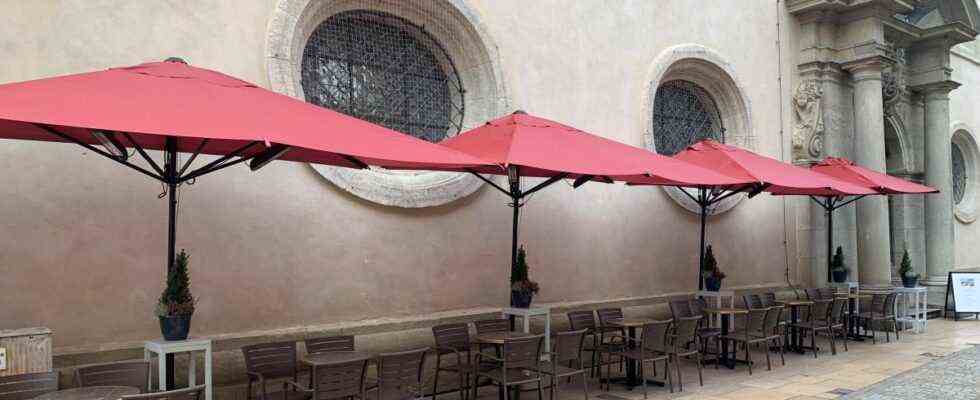If a church and a bar are doing something together, it might be worth a look. Gesandersstrasse in Regensburg is actually one of those typical places in the medieval old town: crooked houses, pavement pavement, church. There are many places here with an almost Italian flair, such as Stadtamhof on the other side of the Danube. The Aperol consumption in summer may even be higher than in Munich. The Gesänderstrasse, however, is actually one thing above all: medieval. Medieval dark. The tourist bus also squeezes through several times a day. It could be so nice, there are several cafés, a bar and a wine shop on the corner directly opposite the church. And nice, it has been since May 2020. After the first hard lockdown, the city approved outdoor seating there, and since then there have been coffee tables, chairs, parasols and pots with flowers right next to the massive church wall.
And the parish not only accepts the open spaces, it expressly wants to keep them. “In the past, our sacristans had to spray away the legacies of the party night on the church wall with a water hose almost every morning,” says Joachim Roller. He is an employee of the parish of the Trinity Church and started a petition in the summer to keep the open spaces because he feared the city might put stone benches there instead. More than 2500 signatures have already been collected. Everywhere in the old town, restaurateurs are hoping that the town hall will not lose the pragmatism it discovered during the pandemic and that the outdoor seating could remain in place permanently.
“Life has come into the alley”
“Since the open-air seats have existed, there are fewer cars on the road, they drive more slowly and it is much cleaner.” In his petition, it is true that the only issue is the free seats in Gesierendenstrasse and on the Mount of Olives, but he wants them to be understood as a call for a new design or maintenance in the entire old town. Roller comes from Freiburg. This is also a city like Regensburg, beautifully postcard. But a city without hustle and bustle, people who not only rush through the streets, but also linger, quickly degenerates into a backdrop for tourists. “It’s going better in Freiburg,” says Roller, and he would like the same for Regensburg.
Jürgen Wittmann, who runs a small hotel and the day bar “Chin-Chin”, a Regensburg institution opposite the church, also likes that. “Life has come into the alley,” he says. During the day. And in the evenings and at night there is less noise and rioting, “because my guests and employees are there”. Many restaurateurs in town see it as he does. Corona drove people outside and they want to stay there now.
Sure, we still have to discuss parking spaces, but almost everyone in this city wants to keep the outdoor seats. But why was a request from the Brücke group recently rejected in the city council? This could be related to the fact that the boss of the bridge is Joachim Wolbergs, the former mayor of the city who was convicted in two corruption trials – not yet legally binding.
He speaks of party-political reflexes – just like politicians from the other parties, incidentally: “You cannot agree to a proposal from the bridge, they would rather chop off their hands,” says Wolbergs, explaining the failure of his application. “Die” – that is the coalition of the SPD mayor Gertrud Maltz-Schwarzfischer. Wolbergs also likes to call them the “gray coalition”. That is of course nasty, although with a merger of the SPD, CSU, FDP, Free Voters and CSB, the question of what this reservoir actually stands for could well arise.
Bridge does something, the others react
The picture looks similar in the dispute over the change of artistic director at the city theater. Actually everyone is equally horrified. 40 employees should lose their jobs by August 2022, when the new artistic director Sebastian Ritschel will take over the theater. This is also euphemistically called “non-renewal” in the industry. Employee contracts are usually issued for the time of an artistic director. And if this ends, they are often not extended. This is legally correct in the theater world, and it is also common. The bridge, however, speaks of the “power to destroy existence” and criticizes the city and its director.
The bridge is accused of wanting to distinguish itself politically with events that take place at every theater in Germany. SPD city councilor Burger thinks that “fronts are pulled up” in this way and that you have to deal with it “with a sure instinct”. On the other hand: It is said of the artists that only the bridge responded to their call for help. “They turned to us,” says Wolbergs. “I’m not sitting there wondering what to write a press release about.”
Wolbergs wants to stay in the conversation with all his might and is preparing his next OB candidacy, you can hear it whispering in the city. By driving the other parties in front of him and focusing on the popular topics. Die Brücke and Wolbergs simply do what one can expect from a party in the opposition and want the best for the city, say others. The Greens, for example, voted in favor of the bridge application for the outdoor seating. “From our point of view, one could have accepted that,” says parliamentary group chairman Stefan Christoph. What has been heard from the coalition on the subject so far has been too vague for him. From his point of view, it is not necessarily the bridge that you should worry your head over in the city, but the CSU. “She just behaves as if she were in the opposition.”

